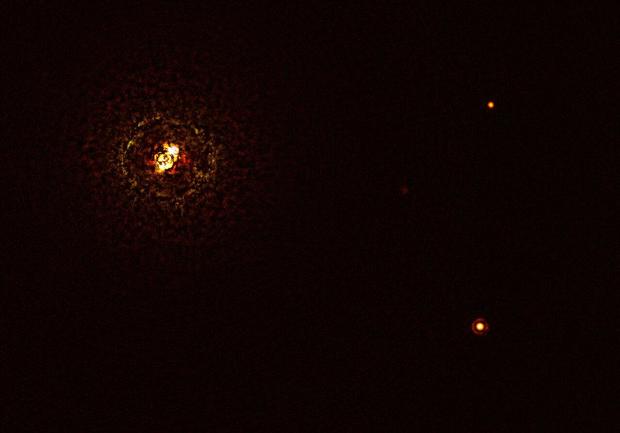Planet ten times the size of Jupiter found orbiting pair of giant stars
Scientists have discovered a planet ten times the size of Jupiter orbiting two stars, scrapping previous understandings over where a planet could exist. The findings were detailed in a new study published in Nature on Wednesday.
The European Southern Observatory's Very Large Telescope in Chile spotted the large mass 325 light-years away in the constellation Centaurus, according to a news release on the study. It orbits "b Centauri," a two-star system at least six times the mass of the sun, which researchers now say is the hottest and most massive planet-hosting system found to date.
"Finding a planet around b Centauri was very exciting since it completely changes the picture about massive stars as planet hosts," said Markus Janson, an astronomer at Stockholm University in Sweden and an author of the study.
The larger star belonging to b Centauri – a B-type star – is three times hotter than the sun, scientists said, and it unleashes a large amount of ultraviolet and X-ray radiation. Heat coming from massive stars have a strong impact on gases, which typically work against planet formation. It was believed the hotter the star, the more radiation it produces, causing material that help planets form to evaporate. Scientists once believed planets could not exist around stars this massive and hot until this discovery.
"B-type stars are generally considered as quite destructive and dangerous environments, so it was believed that it should be exceedingly difficult to form large planets around them," Janson said.
The newly found planet is one of the biggest ever discovered. It moves around the star system in an orbit 100 times greater than the distance of Jupiter from the sun, according to the news release. The distance is key for the survival of the planet, scientists said.
"The planet in b Centauri is an alien world in an environment that is completely different from what we experience here on Earth and in our Solar System," said Gayathri Viswanath, a doctoral student at Stockholm University and co-author of the study. "It's a harsh environment, dominated by extreme radiation, where everything is on a gigantic scale: the stars are bigger, the planet is bigger, the distances are bigger."




